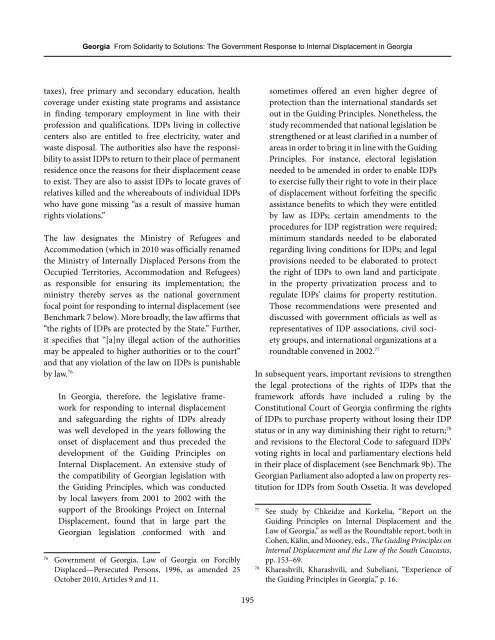From Responsibility to Response: Assessing National - Brookings
From Responsibility to Response: Assessing National - Brookings
From Responsibility to Response: Assessing National - Brookings
Create successful ePaper yourself
Turn your PDF publications into a flip-book with our unique Google optimized e-Paper software.
Georgia <strong>From</strong> Solidarity <strong>to</strong> Solutions: The Government <strong>Response</strong> <strong>to</strong> Internal Displacement in Georgia<br />
taxes), free primary and secondary education, health<br />
coverage under existing state programs and assistance<br />
in finding temporary employment in line with their<br />
profession and qualifications. IDPs living in collective<br />
centers also are entitled <strong>to</strong> free electricity, water and<br />
waste disposal. The authorities also have the responsibility<br />
<strong>to</strong> assist IDPs <strong>to</strong> return <strong>to</strong> their place of permanent<br />
residence once the reasons for their displacement cease<br />
<strong>to</strong> exist. They are also <strong>to</strong> assist IDPs <strong>to</strong> locate graves of<br />
relatives killed and the whereabouts of individual IDPs<br />
who have gone missing “as a result of massive human<br />
rights violations.”<br />
The law designates the Ministry of Refugees and<br />
Accommodation (which in 2010 was officially renamed<br />
the Ministry of Internally Displaced Persons from the<br />
Occupied Terri<strong>to</strong>ries, Accommodation and Refugees)<br />
as responsible for ensuring its implementation; the<br />
ministry thereby serves as the national government<br />
focal point for responding <strong>to</strong> internal displacement (see<br />
Benchmark 7 below). More broadly, the law affirms that<br />
“the rights of IDPs are protected by the State.” Further,<br />
it specifies that “[a]ny illegal action of the authorities<br />
may be appealed <strong>to</strong> higher authorities or <strong>to</strong> the court”<br />
and that any violation of the law on IDPs is punishable<br />
by law. 76<br />
In Georgia, therefore, the legislative framework<br />
for responding <strong>to</strong> internal displacement<br />
and safeguarding the rights of IDPs already<br />
was well developed in the years following the<br />
onset of displacement and thus preceded the<br />
development of the Guiding Principles on<br />
Internal Displacement. An extensive study of<br />
the compatibility of Georgian legislation with<br />
the Guiding Principles, which was conducted<br />
by local lawyers from 2001 <strong>to</strong> 2002 with the<br />
support of the <strong>Brookings</strong> Project on Internal<br />
Displacement, found that in large part the<br />
Georgian legislation conformed with and<br />
76 Government of Georgia, Law of Georgia on Forcibly<br />
Displaced—Persecuted Persons, 1996, as amended 25<br />
Oc<strong>to</strong>ber 2010, Articles 9 and 11.<br />
195<br />
sometimes offered an even higher degree of<br />
protection than the international standards set<br />
out in the Guiding Principles. Nonetheless, the<br />
study recommended that national legislation be<br />
strengthened or at least clarified in a number of<br />
areas in order <strong>to</strong> bring it in line with the Guiding<br />
Principles. For instance, elec<strong>to</strong>ral legislation<br />
needed <strong>to</strong> be amended in order <strong>to</strong> enable IDPs<br />
<strong>to</strong> exercise fully their right <strong>to</strong> vote in their place<br />
of displacement without forfeiting the specific<br />
assistance benefits <strong>to</strong> which they were entitled<br />
by law as IDPs; certain amendments <strong>to</strong> the<br />
procedures for IDP registration were required;<br />
minimum standards needed <strong>to</strong> be elaborated<br />
regarding living conditions for IDPs; and legal<br />
provisions needed <strong>to</strong> be elaborated <strong>to</strong> protect<br />
the right of IDPs <strong>to</strong> own land and participate<br />
in the property privatization process and <strong>to</strong><br />
regulate IDPs’ claims for property restitution.<br />
Those recommendations were presented and<br />
discussed with government officials as well as<br />
representatives of IDP associations, civil society<br />
groups, and international organizations at a<br />
roundtable convened in 2002. 77<br />
In subsequent years, important revisions <strong>to</strong> strengthen<br />
the legal protections of the rights of IDPs that the<br />
framework affords have included a ruling by the<br />
Constitutional Court of Georgia confirming the rights<br />
of IDPs <strong>to</strong> purchase property without losing their IDP<br />
status or in any way diminishing their right <strong>to</strong> return; 78<br />
and revisions <strong>to</strong> the Elec<strong>to</strong>ral Code <strong>to</strong> safeguard IDPs’<br />
voting rights in local and parliamentary elections held<br />
in their place of displacement (see Benchmark 9b). The<br />
Georgian Parliament also adopted a law on property restitution<br />
for IDPs from South Ossetia. It was developed<br />
77 See study by Chkeidze and Korkelia, “Report on the<br />
Guiding Principles on Internal Displacement and the<br />
Law of Georgia,” as well as the Roundtable report, both in<br />
Cohen, Kälin, and Mooney, eds., The Guiding Principles on<br />
Internal Displacement and the Law of the South Caucasus,<br />
pp. 153–69.<br />
78 Kharashvili, Kharashvili, and Subeliani, “Experience of<br />
the Guiding Principles in Georgia,” p. 16.

















